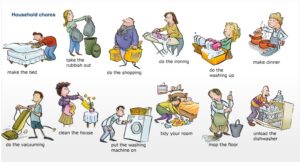Back to: Pre Vocational Studies Primary 5
Welcome to class!
Hello, my bright student! I’m so happy to have you back for another exciting lesson. Today, we’re going to talk about the important roles that each member plays in a family and the different functions that families perform. This is a very important topic because families are the foundation of our society. Let’s begin!
Roles of Each Family Members and Functions of the Family

We’ve talked about what a family is – a group of people related by blood, marriage, or adoption who live together or have close ties and support each other. But within a family, each member has different roles and responsibilities. It’s like a football team – each player has a specific position and job to do for the team to win.
Let’s look at some common roles:

- Parents (Mother and Father): Parents are usually the primary caregivers and protectors of the family. They provide for the family’s basic needs like food, shelter, and clothing. They also teach their children important values, morals, and life skills. They provide love, support, and guidance. The mother often plays a nurturing role, providing emotional support and care, while the father often plays a role in providing security and discipline. However, these roles can be shared and are not always strictly defined.
- Children (Sons and Daughters): Children have the responsibility to respect their parents and other family members. They are also expected to learn and grow, contributing to the family by helping with chores and supporting each other. They bring joy and laughter to the family.
- Grandparents: Grandparents often play a special role in the family, providing wisdom, love, and support. They share stories of the past and teach valuable lessons. They often help with childcare and provide a strong connection to family history and traditions.
- Other Relatives (Aunts, Uncles, Cousins): In extended families, aunts, uncles, and cousins also play important roles. They provide additional support, guidance, and companionship. They are like extra mums, dads, brothers, and sisters.
Now, let’s talk about the functions of the family. These are the important things that families do for their members and for society:
- Providing Basic Needs: Families provide for the basic needs of their members, such as food, shelter, clothing, and healthcare. This ensures that everyone has what they need to survive and thrive.
- Providing Love and Support: Families offer love, affection, and emotional support to their members. This creates a sense of belonging and security. They are there for each other during good times and bad times.
- Teaching Values and Morals: Families teach children important values, morals, and cultural traditions. This helps to shape their character and prepare them for life. They learn about respect, honesty, kindness, and responsibility.
- Socialization: Families help children learn how to interact with others and become productive members of society. They learn social skills, communication skills, and how to behave in different situations.
- Reproduction: Families play a role in continuing the human race through reproduction. This ensures that future generations are born and raised.
Let’s use an example. Imagine a family where the parents work hard to provide for their children. The children help with chores around the house and respect their parents. The grandparents share stories of their childhood and offer wise advice. This family provides for each other’s basic needs, offers love and support, teaches important values, and helps the children learn how to interact with others.
Summary
So, to summarize, each family member plays important roles, and families perform vital functions. These roles and functions contribute to the well-being of individuals and the stability of society.
Evaluation
- Can you name two roles of parents in a family?
- Can you also name two functions of a family?
Wonderful! You’re doing a fantastic job! I’m so proud of your progress.
We have come to the end of this lesson.
In the next class, we shall be talking about the Meaning of Planting Activities.
In case you require further assistance or have any questions, feel free to ask in the comment section below, and trust us to respond as soon as possible. See you in the next class!
